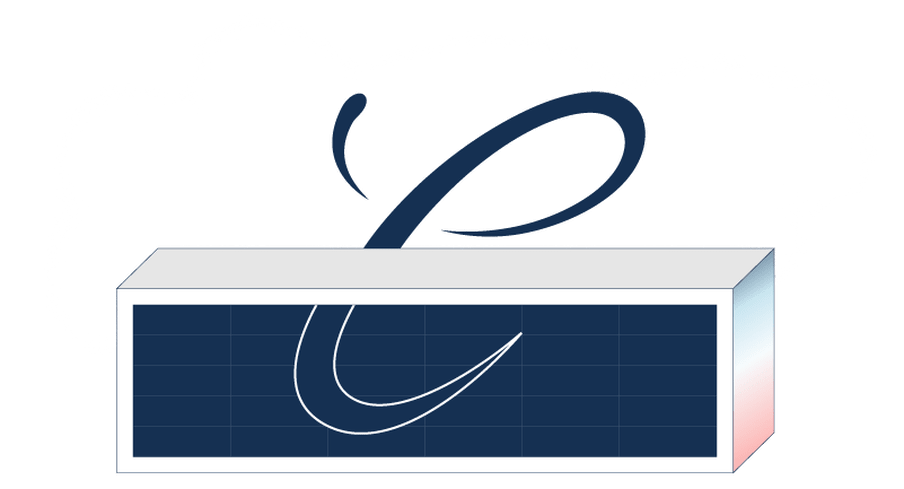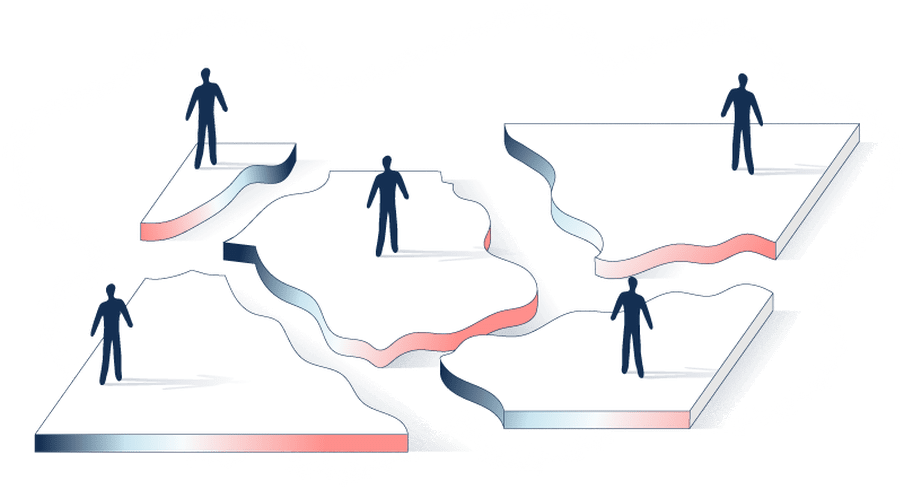Is The Correspondent left or right? Liberal or conservative?
I’m asked this question with surprising regularity.
In this essay I would like to answer it.
The answer starts like this: we’re actually against these dichotomies to begin with — and we’re not in the centre either. We don’t believe you can do justice to human beings — their identities, their political leanings, their worldviews — with a simplistic partitioning like left or right, liberal or conservative, for or against a president.
And we think the same is true of the media. Not only are worldviews (even those of journalists) too complex and mutable for that; the words themselves are far too tainted to still be useful. Because left, right, liberal, and conservative are more disqualifications than definitions these days. They’re weapons in a culture war, meant to label “the enemy”. Expletives, not explanations. Creators of an us/them world.
That’s a war we’d rather not take part in at The Correspondent.

So what is The Correspondent, then?
Those who insist on having a label for us anyway would make us happiest with this one: The Correspondent is grounded in progressive realism. We believe in the possibility of progress — and not without reason. Believing in the possibility of progress isn’t a baseless hope, and it isn’t some esoteric posture either: it’s a rational perspective, based on facts. Because the history of humankind is a history of progress.
Think about it. As I’ve argued before, not a single chimpanzee has ever gone to the moon. Not a single chimpanzee carries everything she knows in her pocket. Not a single chimpanzee has ever been to court. Yet chimpanzees and human beings share a very recent common ancestor.
The reason we’ve evolved from nut-cracking apes into rocket-flying humans is as simple as it is ingenious: there is no species on Earth as good at sharing knowledge as we are.
Everything around us is a product of shared knowledge
No single individual human knows how to build an iPhone, a rocket, or a system of justice, because all of them are the product of shared knowledge.
And they’re the rule, not the exception: from the simplest pencil to the most complex moral philosophy, everything around us is a product of shared knowledge, built up over hundreds of generations.
This principle of sharing what we know enables us to keep specialising in what we’re best at, and makes our knowledge cumulative. Together, we learn more and more. Together, we understand more and more. Together, we can do more and more.
Together, we progress.
Our society has fundamentally changed over the centuries. So why hasn’t our news?
If you’re sceptical of this, do the following thought experiment. Step into a time machine and think of a time you’d rather live in. Aside from a few happy moments in your childhood and a possibly romanticised view of the past thanks to movie industry, I guarantee you: there’s not much of history you’d want to return to. (Unless you think 40 is a good age to die of typhoid fever.)
The speed of human progress has two driving forces. The first is our primary power source. Over the millennia we’ve moved from muscle power to horsepower to coal and steam to oil and natural gas. With every new source of energy, a new era dawned: from hunter-gatherers to agricultural slavery to industrial feudalism to capitalist democracy. And now we’re on the brink of a new revolution: that of a digital service society built on sustainable power.
The second force driving the speed of our progress is the way in which we share knowledge. Over the millennia our information exchange has moved from speech to writing to printing to photography, radio, and television. And here, too, we’re in the midst of a new revolution: digitalisation. The effects of the internet, just two generations old, are already far-reaching, and that reach will keep growing beyond imagination.
But strangely enough one of the most influential sources of information in our society has felt little effect from these changes so far: our daily news. To anyone who visits the Newseum in Washington, D.C., that fact will soon be obvious. Sure, yesterday’s newspapers look old-fashioned. Yes, the language is archaic. Indeed, photos are rare. And obviously, the news traveled significantly slower.
Even two centuries ago, news revolved mainly around conflicts, accidents, tragedies, wars, and the elite
But the main thing you notice is this: the kind of information that we consider news isn’t substantially different from what it was two centuries ago. Even then, the news consisted largely of sensational, exceptional, negative, and current events. Even then, it revolved mainly around conflicts, accidents, tragedies, wars, and the elite. And even then, it was usually presented in short reports topped by a sensational headline with an ad in the neighbouring column. Fundamentally a front page from 1880 isn’t much different from a homepage in 2018.
While the world is progressing at breakneck speed, our news has stood still for decades.

Innovation in journalism: new ways to keep doing the same thing
One reason for that stagnation in the evolution of this daily source of information may be the change-averse worldview that underpins news itself. Nearly every change you see in the news is negative. No wonder, then, that its makers aren’t members of the Church of Progress.
Journalists do often call themselves progressive. And most of them are true idealists — no one goes into journalism for the pay. But when it comes to their own field, journalists are remarkably often just the opposite: sceptical, to the point of cynicism. Despite all the opportunities technology has given us to fundamentally improve the way we present and consume news, recent decades have seen very little change in the nature of the news itself.
“Innovation” in the news industry often means: finding new ways to keep doing the same thing
Part of the reason why is that news outlets were quick to make the mistake of viewing the Internet as “nothing more than a new distribution channel,” says Ernst-Jan Pfauth, my cofounder at The Correspondent. That’s why every year there are countless journalism conferences on new “social media strategies”, new “target audiences”, and new “business models”, but almost none on the question of how we’re going to reinvent the news itself.
To that aim, Ezra Klein’s Vox.com (“Explaining the news”) and Axios.com (“Smart brevity”) are notable exceptions. But generally speaking, “innovation” in the news industry often means: finding new ways to keep doing the same thing.

How news leaves us cynical, divided, and less informed
At The Correspondent, we believe that the kind of information we share each day about the world around us can be better than what the news is now. Newsrooms cannot operate without a shared definition of news that puts everyone working there on the same page. We’re going to try to shift that shared definition in several ways: from the sensational to the foundational, from the episodic to the persistent, from not only what’s wrong to also how to set things right.
And that desperately needs doing. Because the zeitgeist is nostalgic to the point of pessimism. Across the globe, fewer and fewer people believe in the existence of progress. Even worse: for the first time since the 19th century, when the Enlightenment and the Industrial Revolution made belief in progress common, the majority of people in 36 countries believe the world is headed in the wrong direction.
Also gaining ground is the idea that the lives of our children and grandchildren will be worse than our own. There’s a reason people voted to “Make America great again” — back to the good old days, when everything supposedly was “better”.
And perhaps worst of all: for years now, people have been growing more divided. Political differences are driving wedges between family and friends. Social media can barely be called “social” anymore. Mistrust of “The Other” is growing around the globe. In the last 20 years, in fact, more physical walls have been built between countries than in all of human history before that.
One of the great drivers of the growing polarisation is the news we consume every day
And the irony is: one of the great drivers of this waning belief in progress, and this growing polarisation, is the news we consume every day. For news is one of the most cynical-making, division-sowing, and mistrust-breeding information sources we have.
If I were a populist with autocratic tendencies, looking to gain power by pitting people against each other, I would instantly tap the news as my propaganda machine of choice. The news is, after all, one long advertisement for the claim that everything used to be better, that people can’t be trusted, that the familiar is better than the foreign, and that civilisation is just a thin veneer that can only be maintained through rules, control, and authority.
A twenty- four seven ad, no less, that flies the flag of objectivity.

Beware: progress is a fact, but not a given
For the record, I’m not suggesting we adopt blind optimism instead — as if the future can only unfold in one direction, the good one. Progress may be the thread that runs through human history, but it’s far from inevitable. While almost everything in the 20th century got better — over the course of a century we created more prosperity than in all of prior history put together — it was also the century of our bloodiest wars ever.
Progress is a fact, not a given.
So I’m not arguing for changing the news into one big “everything’s awesome” show. Too much optimism about progress could blind us to the vast systemic injustice that still exists in the world — and makes us complacent about how progress actually comes about. Progress is always a question of blood, sweat, and tears. So here’s what an antidote to the pathological pessimism of news is not: relativising away all the world’s misery, or assuming that everything always gets better automatically.
At The Correspondent we stand for constructive journalism: making a kind of news that highlights both what’s wrong and what we can do about it. Constructive journalism digs deep to uncover systematic injustice and then offers a perspective for action, by also focusing on potential solutions.
Constructive journalism identifies problems in a way that offers perspective, provides hope, and inspires people to help solve them
That means journalism rooted in progressive realism can, just like the daily news, be alarmist. Reality is full of potential (and actual) decline — from ecological destruction to the breakdown of fundamental human rights; from looming financial crises to institutionalised racism and sexism. And all of these serious, systemic problems are constantly in danger of falling off our radar, because so much news is too event-driven and recency-biased to notice how gradually they develop.
But unlike the daily news, constructive journalism doesn’t scream bloody murder and then waltz off, leaving its reader powerless, cynical, and scared. Instead, it identifies problems in a way that offers perspective, provides hope, and inspires people to help solve them. In a nutshell, it tries to be useful.

The news is broken — let’s unbreak it together
To do that, we need a different kind of news. Not breaking news, but unbreaking news.
Currently, our news misinforms us on a fundamental level: it tells us what happened today, but rarely what happens every day. As a result it mostly educates us on the exceptions, leaving us in the dark about the rules. And the overwhelming rule is actually that billions of people cooperate on a mind-boggling scale to make the world a better place every day. Watch too much news and eventually, you’ll mistakenly think that’s the exception.
Surrounding this failed definition of news is a failed business model. Ever since its inception in the late 19th century, professional news production has been primarily paid for by selling audiences to advertisers. This advertisement model rewards the most attention-grabbing instead of the most important. It prefers recency over relevance, and visibility over influence.
And by doing so, it lessens our ability to progress. Because instead of spreading knowledge and furthering the human ability to understand and cooperate, it spreads outrage, conflict, and polarisation. In the end, it leaves us less informed about the world we live in, and more cynical about our ability to change it.
That’s why The Correspondent will adhere to a different definition of news, with a different business model to sustain it, and a collaborative way of producing it. We want to work with our knowledgeable members to uncover what’s hidden in plain sight, and then work together on changing the world for the better.
In the Netherlands, where our platform originated, we’ve been successfully doing just that for five years now.
We asked members to share their personal debts and debtors with us to shed light on a fundamentally broken debt industry, and proposed legislative changes to the Dutch parliament through a petition signed by more than 30,000 readers.
We organised the largest group interview with refugees ever conducted by pairing them with members, giving a voice to hundreds of newcomers in our country.
We collaborated with members who were Shell insiders to unearth internal documents that showed the Dutch oil giant knew about climate change for more than three decades, inspiring shareholders to push hard for the company to go green.
We collaborated with members who founded The Black Archives to bring to light the suppressed Dutch history of genocide and colonialism that is still not part of the mainstream educational curriculum.
We worked together with a local feminist movement to discover that 80 percent of streets named after a person in the Dutch capital Amsterdam were named after a man, and made headlines worldwide by changing them to honour women.
The human purpose is best served by sharing knowledge about the fundamental changes hidden in plain sight
And together with thousands of members, we organised a ‘Change your bank’ week, collectively transferring our accounts (including the company accounts of De Correspondent) to a more social financial enterprise that would not invest our money in fossil fuels or weapons of war.
And I could list dozens more.
All of this is bound together by a core belief that is the foundation of our journalism: that the human purpose is best served not by just sharing outrage over the latest hype or scare, but above all by sharing knowledge about the fundamental changes hidden in plain sight.
That’s not left or right, liberal or conservative, pro-Trump or anti-Trump. It’s common sense, with an emphasis on common.
Together, we can still progress.
This article was first published on Medium.com, and has been modified from its original version.


